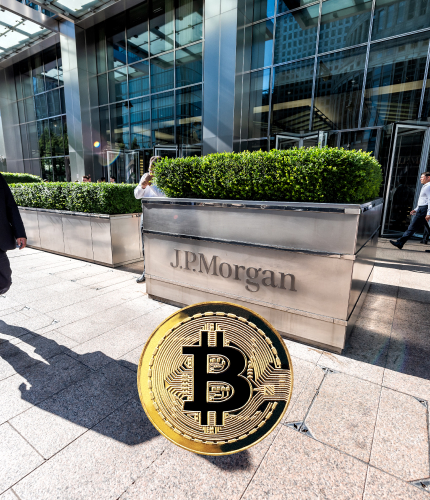In a surprising move, JP Morgan Chase has recently informed its UK customers that any attempts to engage in crypto-related payments will be met with denials. The banking giant has cited “fraud and scams” as the primary reasons behind this stringent decision.

The Crypto Conundrum
The cryptocurrency landscape is currently undergoing a pivotal phase, reminiscent of the famous saying, “Then they fight you.” It appears that UK banks are hastily severing the fiat rails connecting their customers to the world of cryptocurrencies, including popular assets like Bitcoin. This move is executed without any prior communication with customers and without considering the reasons why these individuals may want to invest in Bitcoin. One compelling motivation could be safeguarding themselves from the devaluation of fiat currency, which is a constant threat in traditional banking institutions.
Banks Versus Bitcoin
For traditional banks, the concept of Bitcoin is nothing short of anathema. It represents an asset that lies beyond their sphere of control and manipulation. These financial institutions have previously showcased their ability to influence markets, as seen in their manipulation of paper futures markets to suppress prices of commodities like gold and silver, allowing them to procure these precious metals at reduced costs.
A press release from the Department of Justice sheds light on JP Morgan Chase’s past behavior. Acting Assistant Attorney General Brian C. Rabbitt commented on the bank’s actions:
“For over eight years, traders on JP Morgan’s precious metals and U.S. Treasuries desks engaged in separate schemes to defraud other market participants that involved thousands of instances of unlawful trading meant to enhance profits and avoid losses.”
He further emphasized:
“Today’s resolution — which includes a significant criminal monetary penalty, compensation for victims, and requires JP Morgan to disgorge its unlawful gains — reflects the nature and seriousness of the bank’s offenses and represents a milestone in the department’s ongoing efforts to ensure the integrity of public markets critical to our financial system.”
This instance is just one among several grave instances of “fraud and scams” perpetrated by the bank, resulting in penalties amounting to a staggering $920 million.
Clearing the Path for CBDCs
Speculation on social media is rife that JP Morgan Chase’s actions may be a precursor to the introduction of a central bank digital currency (CBDC). Such a development could grant central banks unprecedented control over their citizens, allowing them to disconnect individuals from the financial system at their discretion, without the need for protracted legal procedures. This notion mirrors the actions of the Canadian government, which froze and seized the bank accounts of citizens who supported the trucker protests in Ottawa early in 2022.
Banks at a Crossroads
This period in history is undeniably momentous. Traditional banks find themselves locked in a battle for relevance as they grapple with perceptions of obsolescence and authoritarian control, often failing to meet their customers’ evolving needs.
Technology, as history has shown, cannot be suppressed indefinitely. Banks now face fierce competition from private cryptocurrencies that offer speed, security, and the elimination of intermediaries. The outcome of this clash between governments, banks, and the crypto sphere remains uncertain, but it underscores a fundamental shift in the financial landscape.
Disclaimer: This article is provided for informational purposes only. It is not intended as legal, tax, investment, financial, or other advice.
- Why Every Business Needs a Website in 2026
- Netflix Rom-Com Based on Bestselling Novel
- General Hospital Fans Want Drew’s Storyline to End After Shooter Reveal
- The Odyssey’s Matt Damon Reveals How Much Weight He Lost for Odysseus
- Trump withdraws US from dozens of international and UN entities
- Taylor Swift Reveals Elizabeth Taylor’s Estate’s Reaction to The Life of a Showgirl Song